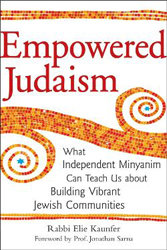Join a community of readers who are committed to Jewish stories
Sign up for JBC’s Nu Reads, a curated selection of Jewish books delivered straight to your door!
In his last posts, Rabbi Elie Kaunfer, the author of Empowered Judaism: What Independent Minyanim Can Teach Us about Building Vibrant Jewish Communities, wrote about learning to bake your own matzah and new models for engaged Jewish life. He has been blogging all week for Jewish Book Council and MyJewishLearning’s author blogging series.
 Imagine you don’t know how to read a novel.
Imagine you don’t know how to read a novel.
Now, this is a thought experiment, so bear with me: You know how to read other books and essays, but you don’t know how to read a novel.
But instead of learning how to read a novel, you find another solution: a blog about novels. This is sort of a 21st century version of Cliff’s Notes. You get the blogger’s take on the novel, but you have to trust her to convey the meaning of the novel itself.
Then you discover a whole world of blogs on novels. Dozens of blogs. Soon you start getting weekly emails from the bloggers. Then they come daily. You are awash in other people’s takes on the novel. You start to become overwhelmed.
Then you find the answer: a “best of novel blogger” site. Now you don’t have to read all those blogs, you can just tune in to the best blog takes on the novel.
But you still can’t read a novel.
Now substitute the novel for Jewish texts –- Torah, Talmud, Kabbalah -– whatever you like.
Most of us can’t read the texts ourselves. So we rely on the blogger –- a translator or interpreter -– to help us understand the text. In the olden days, we were stuck with one blogger -– the local rabbi. Good or bad, he (and the rabbi was usually a “he”) was the one tell who would tell us what was in the texts.
Then along came the internet. We no longer had to rely on the local rabbi for a take on the text. We could sign up for email lists and read blogs. Then it became overwhelming. So we picked a few to read. Or maybe we stopped altogether.
But we never learned to read the text.
So what is the role of the rabbi nowadays? At a minimum, a rabbi should be someone who is the “best of the novel blogger” – someone who is more than mediocre, who can offer enlightening opinions, and stand out among the cacophony that the internet has bequeathed to us.
But what if the rabbi were actually a teacher who empowered us? What if the solution to the cacophony was to dive into the source for ourselves, form our own interpretation and offer our own opinion? What if we learned to read the novel, as it were? In that vision, the rabbi is the guide: someone who teaches us how to read, not someone who tells us what it says. She could direct us, and steer us away from faulty interpretations. But ultimately we could add our own voice to the conversation. We could make meaning on our own, and we could see the value in the original text, not only the interpretation.
These days, other people’s interpretations are a dime a dozen. Finding a blog is easy. Bringing our own self to the original text is an all-too-rare event (just think of how many people actually read the Health Care Bill or the State of the Union Address).
Imagine a world in which people only talked about novels, but never actually read them. If novels don’t matter, then no problem. But if they do matter….
We live in a world where people often talk about Jewish texts, but don’t actually read them. If we don’t think these texts have much importance for our lives, no problem. But what if they do matter? Wouldn’t we want to access them directly?
Jewish vibrancy, as I argued in Empowered Judaism, is not about handing off the text to someone else. It is about internalizing the text -– with a guide, a real teacher -– and then taking that text seriously.
There’s a reason that Cliff’s Notes were forbidden in high school.
Rabbi Elie Kaunfer is the author of Empowered Judaism: What Independent Minyanim Can Teach Us about Building Vibrant Jewish Communities. He’s been blogging all week in Jewish Book Council and MyJewishLearning’s Visiting Scribe.